Born To Serve:
Dean Caldwell Ferris
By M.A. Cashman
One of a generation destined to serve, Dean Ferris was born May 24, 1920 in Braddock, PA, across from the steel mills, and right at the end of World War I. Dean's father, one of the first engineers to graduate from Bradley Polytech in Peoria, IL, went to work at Westinghouse after graduation.
Dean's parents met at a football game at Bradley, married and settled down in the Pittsburgh area to raise a family. They had three boys and a girl; Dean was the youngest.
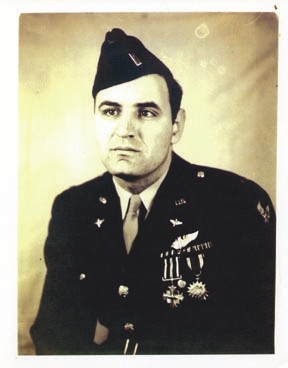 At Westinghouse, Dean's father became Head of Transportation Generator. Then came the Depression, a time Dean describes by saying, "We were all so dumb, we didn't know we were poor. That was the time when companies gave their employees two month's vacation without pay." At Westinghouse, Dean's father became Head of Transportation Generator. Then came the Depression, a time Dean describes by saying, "We were all so dumb, we didn't know we were poor. That was the time when companies gave their employees two month's vacation without pay."
Pittsburgh was hit hard during the Depression. Dean recalls, "There were college graduates selling apples on the street corners." During that time, Dean's father signed over the family home as collateral to save their church, Swissvale Methodist. With admiration and humor, Dean remembers his father as ". . .very straight and fair. . . such a dyed-in-the-wool Republican, he wouldn't take a Roosevelt dime in change." Chuckling, he recalls how his father used to say, "There ain't no free lunch"
While raised in a small town, Dean attended the large central high school. There he played football for three years, breaking his shoulder twice and his hand once. Later he broke his nose as a Golden Gloves boxer. He was a big man with a ready smile. After high school, Dean's father gave him $300 and said, "Go to college."
So Dean went 120 miles away to Muskingum, a Presbyterian College in Ohio. While many students were pre-ministry majors, Dean's first choice was to be a social worker. Pursuing his second choice, he transferred to the University of Pittsburgh to study Engineering. During summers, Dean worked in the coal mines and the steel mills to help pay tuition. While Dean was in college, however, there were international events fomenting to redirect the course of his life after graduation.
In 1939 Dean helped survey the first Pennsylvania Turnpike. That same year, France and Britain declared war on Germany, officially beginning World War II. Europeans who opposed the aim of the victors in World War I - "Make the world safe for democracy" - were attracted by the promises of nationalist, militaristic totalitarianism. The war that resulted was to involve every major power in the world, and prove more costly than all other wars combined.
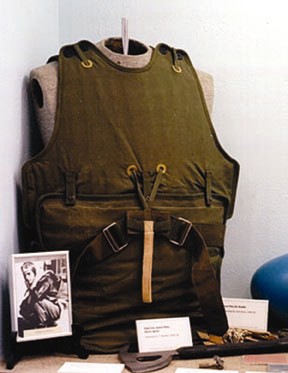 In 1940 President Franklin Delano Roosevelt signed The Selective Training and Service Act, creating the country's first peacetime draft. Letters went out to young men all over the country. In June of 1941, three weeks after graduation from Pitt, Dean received his. In 1940 President Franklin Delano Roosevelt signed The Selective Training and Service Act, creating the country's first peacetime draft. Letters went out to young men all over the country. In June of 1941, three weeks after graduation from Pitt, Dean received his.
He smiles as he recalls the opening words, "Greetings. Your friends and neighbors have chosen you. . ." Dean was drafted and went to basic training camps in Odenton, MD, Petersburg, VA, and Victoria, TX. When he saw the air field at Victoria, he reconsidered his initial decision to join the Army.
Dean had done some flying as part of the Civilian Pilot Training (CPT) in Muskingum with John Glenn. They were among the scores of approved CPT pilots to enlist in the Army or Navy Air Corps. So Dean decided to leave the Army and join the Air Force. Four months later, after 300 hours flying, he achieved the required levels in all three categories: pilot, navigator, and bombadier.
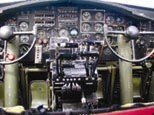 Dean finished training in Lewiston, MT as a 2nd Lieutenant in the Air Force. Some people there decided to give the young airmen a mascot, and presented them with a cub bear. They named the bear Roscoe and took it with them to England. Dean finished training in Lewiston, MT as a 2nd Lieutenant in the Air Force. Some people there decided to give the young airmen a mascot, and presented them with a cub bear. They named the bear Roscoe and took it with them to England.
In December of 1941, when Japan attacked the US military base at Pearl Harbor in Hawaii, the US was catapulted into the conflict between the Axis powers of Germany Japan and Italy, and the Allies, chiefly Great Britain, the US, and the Soviet Union. It was to be known as World War II.
In February 1943 the 390th bomb group was formed, at station 153 in Parham, Suffolk, on the northeast coast of England. On August 12, 1943 the group began flying B-17s, ten men to a plane, on raids to Germany. As a Lt. In the 8th Air Force, Dean was in that group.
Dean recalls their adventures with the bear cub Roscoe, " It stayed in the barracks. It was fun seeing it in the showers. We'd put it on a leash and go down to London." Dean relates how the cub changed crews, "The guys on the plane next to us said that they'd take care of Roscoe." Then, he says, "One day they all got shot down. So we took Roscoe over again. When he got big, and so strong we couldn't handle him, that's when we gave him to the London Zoo."
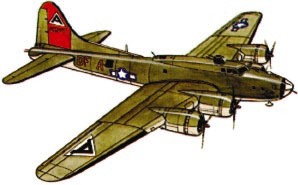 When in London, the pilots saw no children in the city. "They sent them all to the country," Dean says, adding, "We would have parties for the children at the air base. The most prized possessions were oranges. So we would take a plane to Africa, get a load of oranges, and bring them back to the kids." When in London, the pilots saw no children in the city. "They sent them all to the country," Dean says, adding, "We would have parties for the children at the air base. The most prized possessions were oranges. So we would take a plane to Africa, get a load of oranges, and bring them back to the kids."
During this time they were flying daylight missions from England, over to Germany, and back. He describes how, "They flew without a fighter escort, so there was always a chance that they would be jumped and shot up."
Their losses were tremendous. Dean describes how, "They were flying against Hitler's hot shots and got shot up pretty bad." After every mission they lost between 10 and 15% of their planes. One time they crossed the Atlantic with a group of 36 planes and came back with 4. Another time they lost a plane in the Mediterranean.
Then there was the time they ran out of fuel while flying down to Africa and they had to ditch the plane. Dean taught them how to ditch, to the chant, "Dinghy, dinghy, dinghy, ditch, ditch, ditch, let's get out of this son of a bitch." That time they were in the water from 1:00 PM on one day until 11:00 AM the next morning when a British destroyer picked them up. Still another time they had to parachute over England when one engine went out and their plane caught fire.
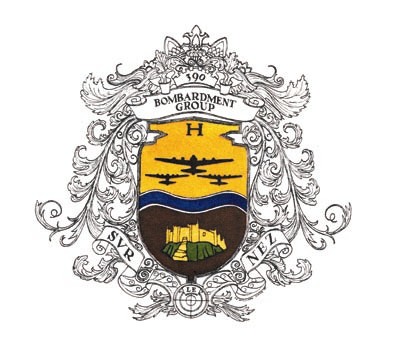 Dean recalls being pilot when, "One day the elite 100 group just ahead of us was flying to Munster and disappeared - all 18 planes shot down. Fragments of planes and bodies were flying against our plane." Two of their most dangerous incursions were Munster and Scheinfurt. Dean's closest call was on the raid to Munster. He was flying bombadier when their plane got shot up. A rocket hit the wing, and the pilot and co-pilot couldn't hold it steady and it was diving. They were hollering for help, and Dean ran up to the cockpit, grabbed the yoke, braced himself against the wall behind the pilot and pulled the plane out of the dive. Dean recalls being pilot when, "One day the elite 100 group just ahead of us was flying to Munster and disappeared - all 18 planes shot down. Fragments of planes and bodies were flying against our plane." Two of their most dangerous incursions were Munster and Scheinfurt. Dean's closest call was on the raid to Munster. He was flying bombadier when their plane got shot up. A rocket hit the wing, and the pilot and co-pilot couldn't hold it steady and it was diving. They were hollering for help, and Dean ran up to the cockpit, grabbed the yoke, braced himself against the wall behind the pilot and pulled the plane out of the dive.
Another time he came back to the barracks, the only one left from a raid. He recalls how, "The flight commander and the chaplain came over to sleep with me that night. Then the next day I had to go through all the foot lockers. . . look through the effects of those who were shot down and compose a letter to their survivors. When you do twenty or thirty of those, you begin to appreciate how it affects you. No one can convince me that war is great." The loss of American planes and crews increased sharply as the bombers penetrated deeper into Germany. After October of 1943, when strikes at ball-bearing plants in Schweinfurt incurred almost 25% losses, daylight sorties were curtailed.
With his ready smile, Dean is eager to share stories about the good times. "Thank God we had something to laugh about," he says. One day when they were off at the air base, they decided to have a dance, and went over to Redgrave Hospital, about 80 miles away, to pick up some nurses. They were going to have a good time, then fly the nurses back.
He recalls with pleased amusement, "Well, the nurses spread out all over the base. There were forty of them. We'd get one of them in the back door of the plane, another would jump out the front. Finally we got them all in, only to find out that we were fogged in. So we got four Army trucks and drove them back." Because all the road signs were gone, it was about 5:00 AM when they got back to the hospital. When they dragged in, the head nurse said to Dean, "Lieutenant, don't you know these nurses are going to be on duty in a half an hour?"
Dean flew B-17s until he finished combat, from 1942 until 1943, a total of 25 missions. He earned a Distinguished Flying Cross (DFC), seven air medals, and two Presidential citations. Dean recalls his surviving the war, saying, "The diploma I am most proud of is called the 'Lucky Bastard' from General Curtis Le May. It hangs on my wall today."
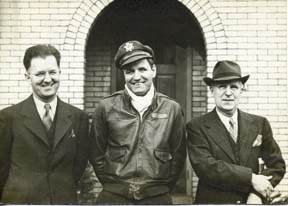 In 1943, discharged as an Air Force Captain when he was 23, Dean went to Westinghouse where he became Manager of Air Craft Equipment R&D. His office bid on government contracts, handling an annual budget of $2 million and, at one point winning a contract over the bid of Howard Hughes of Hughes Aircraft. He also supplied the CIA with planes to be used for drug interdiction. When Westinghouse moved the plant to Baltimore, Dean moved, too. In 1944 he married Mildred Kenney, a nurse from Wilmington, whom he had known from summers at Ocean City, MD. He saw the end of World War II as a civilian. In 1943, discharged as an Air Force Captain when he was 23, Dean went to Westinghouse where he became Manager of Air Craft Equipment R&D. His office bid on government contracts, handling an annual budget of $2 million and, at one point winning a contract over the bid of Howard Hughes of Hughes Aircraft. He also supplied the CIA with planes to be used for drug interdiction. When Westinghouse moved the plant to Baltimore, Dean moved, too. In 1944 he married Mildred Kenney, a nurse from Wilmington, whom he had known from summers at Ocean City, MD. He saw the end of World War II as a civilian.
In September of 1945, with the surrender of Japan, World War II finally ended. Because of the vast and chaotic sweep of the war, precise record keeping was impossible. Rough estimates show the total human cost to be 55 million and the total monetary cost to be one trillion dollars.
Dean and Mildred had four children: two sons and two daughters. One son died at 19 in a plane crash; the other son lives in California and works as a lawyer and VP at 20th Century Fox. One daughter is a principal in the Baltimore City School System and the other is married with five children. Dean has seven grandchildren and two great-grandchildren.
Mildred died in 1980 and in 1988 Dean married Edna Buckmaster Tull, a widow and one of Mildred's best friends. Dean kept up his love of flying. For ten years he was a consultant on the repair and maintenance of planes at the Smithsonian facility at Silver Hill, MD and on building an airplane in a friend's garage.
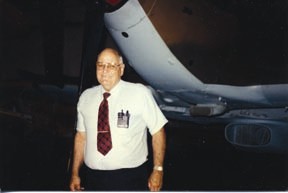 Over the years, Dean has maintained the conscience of the college freshman who wanted to be a social worker. He joined the Elks, the American Legion, and since 1988 he has been active in the Kiwanis Club of the Severn. He has served as club president and as club secretary for more than ten years. He supports programs that help young children, especially those of the Salvation Army and Central Special School in Edgewater. Over the years, Dean has maintained the conscience of the college freshman who wanted to be a social worker. He joined the Elks, the American Legion, and since 1988 he has been active in the Kiwanis Club of the Severn. He has served as club president and as club secretary for more than ten years. He supports programs that help young children, especially those of the Salvation Army and Central Special School in Edgewater.
Confined to a wheelchair after a back operation in 2000, Dean remains a jocular, easygoing, unassuming, "people person" involved in community service projects. His wheelchair does not prevent him from participating in Kiwanis activities for children, including ringing the bell for the Salvation Army, supporting Terrific Kids Award ceremonies, and playing Santa Claus for the Christmas Party at Central Special School, where many of the kids are also in wheelchairs.
And Dean continues to open the Thursday morning breakfast meeting by leading the members in singing a patriotic song. His favorite: God Bless America.
TOTAL COST OF WORLD WAR II
Human Cost:
25,000,000 military
30,000,000 civilian (including 6 million victims of the holocaust)
55,000,000
TOTAL
Monetary Cost:
$341,000,000,000 USA
$272,000,000,000 Germany
$192,000,000,000 Soviet Union
$120,000,000,000 Britain
$1,000,000,000 TOTAL
The 390th Heavy
Bombardment Group:
The 390th participated in 301 operational missions, dropping over 19,000 tons of bombs. 179 of its aircraft were lost, with 147 missing in action and 32 due to other causes. The Group's accomplishments show a total of 378 enemy aircraft destroyed, 78 probably destroyed, and 97 damaged. The Group was awarded two Presidential Unit citations, six Battle Streamers and many commendations. During its combat history the Group's bombing accuracy was reported as the best in the 8th Air Force and its aircraft losses were the lowest per mission flown/bombs dropped.
The 390th Memorial Museum
6000 East Valencia Road
Tucson, Arizona 85706
Back
|

